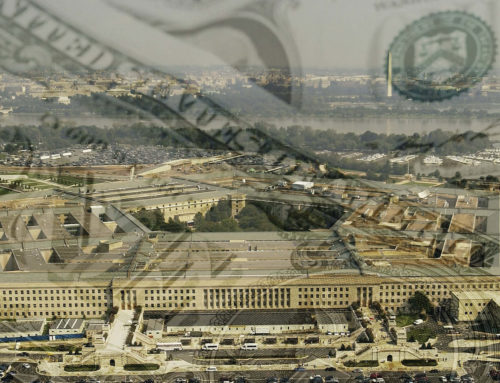Last week we wrote that a bad legislative process often leads to a bad result. Last week it was the Farm Bill. This week the exact same thing can be said about the massive Pentagon policy bill.
Bad process? Yep. This bill, the National Defense Authorization Act (NDAA), seeks more than $700 billion for the Pentagon and also affects policy. The massive legislation attracted close to 600 amendments from lawmakers. And the House speed-voted its way through hundreds of those amendments without actual debate.
One tactic to churn though the bill is to pull many of these highly disparate issues into a few massive “en bloc” amendments that typically pass without debate and via a voice vote. It is efficient, but it is also largely without debate and discussion. As a result, a vote to pass en bloc amendments means some odd things end up being nominally “accepted” by the House. Then, when the House and the Senate meet to hammer out the differences between the two versions of the bill, the House negotiators quietly drop some of the provisions if there is any pushback from the Senate. And since there was no vote on the actual issue to point to, the sponsors of the original amendments have no real power to insist the House leadership fight for the issue.
Some of those hundreds of amendments were thoughtful attempts to make the bill better in some way: improve oversight of Pentagon programs, reduce wasteful spending, ensure our warfighters get the best equipment at the best price. We had a long list of amendments we supported for just those reasons.
And some were pure dreck.
There were those that had zero to do with the Pentagon. For instance, an amendment to “improve” to National Environmental Policy Act (NEPA) reviews conducted by the Department of the Interior. Well, leaving aside the merits or demerits of the amendment or whether it would actually “improve” anything – it doesn’t belong in the Pentagon policy bill. This amendment should be made to a bill that actually has something to do with the Department of the Interior.
Another amendment was to include the analogous bill authorizing the U.S. Coast Guard. Yes, the Coast Guard is a military service, but it has never been part of the Department of Defense. It’s part of the Department of Homeland Security (DHS) and should be authorized via legislation devoted to DHS.
Other amendments amount to pure crony capitalism. Lawmakers tried to force the Pentagon to purchase flatware (knives and forks) and dinnerware (plates and cups) only from U.S. manufacturers. You probably already guessed it, the two lawmakers behind these amendments, Reps. Tenney (R-NY) and McKinley (R-WV), also happen to represent the only apparent domestic manufacturers that would meet the new requirement. Shame on them. Pentagon legislation should never be treated as a jobs bill. In fact, the House Armed Service Committee Chairman, Rep. Thornberry, said this in his floor speech against these amendments:
“Creating domestic jobs is not the primary mission of the Department of Defense.”
We would argue that creating domestic jobs is never a mission of the Pentagon. We’ve said it many times: let the Pentagon set a reasonable standard and select the supplier or contractor based on the best product. Our men and women in uniform deserve nothing less. Besides the only concern in the mess hall is the quality of the chow, not what it’s served on.
What’s the definition of insanity? Something about doing the same thing over and over and expecting a different result. Well this is the 58th year in a row that the Congress will pass the NDAA. And at Taxpayers for Common Sense we may be insane to expect a better process, but the status quo makes us just plain mad.














Get Social